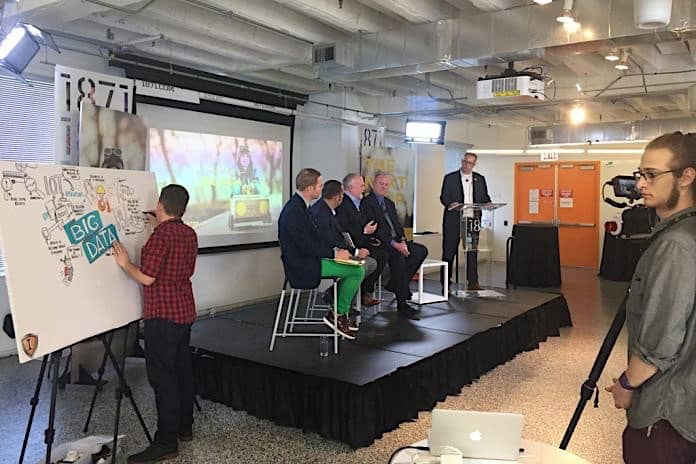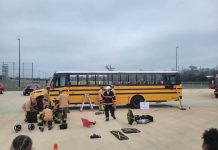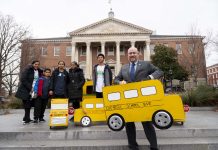The inaugural IC Bus Innovation Summit in Chicago brought together representatives of school districts, school bus contractors, OEMs, technology providers, educators, journalists and industry associations to share ideas on several trends. Those trends include the internet of things (IoT), data security and autonomous vehicles.
The all-day event on Wednesday featured book-end presentations by Howard Tulman, CEO of host 1871, a tech incubator and think space for local entrepreneurs, and Howard Putnam, a former CEO of Southwest Airlines.
Trish Reed, vice president and GM of IC Bus, kicked things off sharing with attendees that the industry needs to be proactive rather than reactive, and to take advantage of technological trends rather than to fall victim to them.
“We have to control our own destiny,” she said, before encouraging all to open their minds and “think of the future without the constraints of today.”
Tulman then launched into the day’s discussions by likening technology to a 200-pound baby, enormous and full of potential, but still highly immature. It is also feeding on the impatience of a connected society and a “right-now” economy.
“Today, it’s not the big that eat the little, but the fast that eat the slow,” he said. “If you’re not in a big hurry, you’re probably too late. We’re playing the whole game in overtime.”
In between discussions, attendees rotated among various breakout sessions. One focused on the technology and learning equality afforded by school bus Wi-Fi, with one speaker touting the benefits of wireless connectivity, which gives students the opportunity to do homework during long bus rides.
This viewpoint was decried by the other panelist, who pointed out students may need those longer bus rides home to disconnect from technology and release the pressures built up during the day.
Another session brought together representatives of a local school bus contractor, two alternative engine manufacturers and the Chicago Department of Transportation to discuss the path of alternative fuels, such as electric buses, which some felt should be more viable in the coming decade.
One discussion centered on the potential dangers of the widespread use of technology, including how inexpensive devices may lack proper security. Greg Lindsay, senior fellow at both the New Cities Foundation and the Atlantic Council, warned that, “we run the risk of deploying technology before we know the usefulness of it.”
He added how improper security standards could pose a risk to protecting district information, such as student transportation operations, student info and the school buses.
Fellow panelists, Jason Corbally, president of Education Logistics, and Ted Thien, vice president and general manager of Versatrans at Tyler Technologies, both agreed that software companies must work together to develop the necessary security and policy standards for the school bus industry, while also ensuring parents receive the information they need, namely the location of their children.
During a session on transportation trends, Keith Henry, president of the National Association for Pupil Transportation, talked about the school bus driver shortage. He also addressed the role technology in making their jobs easier, which he has seen firsthand as director of transportation for Lee’s Summit R-VII School District near Kansas City
“Technology enhances the driver’s ability, not detract from it,” he said.
Several speakers addressed concerns about what the rise of autonomous vehicles could mean to the traditional role of school bus drivers.
For instance, Deborah Halvorson, a consultant and a former congressional representative and state senator, said that even with the rise of driverless vehicles, school buses will always need adults on the bus for student supervision.
At a later discussion, Frederick Andersky, director of customer solutions and marketing at Bendix Commercial Vehicle Systems, echoed these comments, saying driver assistance technology, especially for school buses, does not equate to driver replacement systems.
This was furthered by Charlie Hood, executive director of the National Association of State Directors of Pupil Transportation Services, who said that technology could make the job of driving the school bus easier, suggesting that many operations, such as the process of stopping at all railroad crossings, could eventually be automated.
He added that high-tech examples such as Wi-Fi on buses, as well as low-tech examples like driver-initiated reading programs for students, could improve the learning environment while also improving behavior.
Likewise, Northwestern University researcher Mike Hyland said the school bus industry can learn a number of lessons from not only the passenger vehicle and trucking industries, but the upstart ridesharing companies.
“I don’t think Uber and Google will be building buses anytime soon, but they have a certain expertise that can be tapped,” he said.
IC Bus’ Reed added at the summit’s conclusion that the OEM will be soon issuing a white paper based that outline possible next steps for the industry.
Putnam provided the closing remarks in his talk titled, “Innovation: Some Play the Game—Others Change the Way the Game Is Played.” This starts with an organization’s people.
“If you can put your people in the right frame of mind and they feel empowered to tell you what they think, inspiration follows,” he said.
In addition, the success of companies and school districts rely on those same people being able to speak up when the vision and innovation is ill-conceived or the timing isn’t right.















